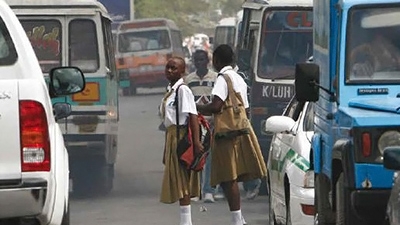Better roads, better world
The inaugural event, which was organized by the International Road Federation, hosted by the Federal Ministry of Works and supported by GRSF, delivered practical guidance across various transportation challenges, including road safety, infrastructure asset management, innovative public-private financing and capacity building of transport professionals. It brought together regional and local stakeholders from government, academia, multilateral banks, civil society and the private sector to help find solutions to the region’s most pressing transportation challenges.
The event was officially inaugurated by Nigeria’s Vice President Namadi Sambu who, on behalf of President Goodluck Jonathan, said that the congress came at an opportune time when the administration was committed to expanding road infrastructure.
Sambu explained that the theme of the event “Harnessing Africa’s Transportation Potential: the Role of the Stakeholder” was indeed pertinent as the government was implementing various projects that aimed to provide better and safer roads for Nigerians.
At the same opening ceremony, Nigeria’s Minister of Works, Mike Onolememen, welcomed some 250 participants to the historic event, and said that the huge infrastructure gap in Africa offered great opportunities to foreign investors.
The International Road Federation President & CEO, Patrick Sankey, said that IRF was a global advocate for better roads around the world where it offers a range of capacity building services, and the facilitation of public-private partnerships.
“Let’s make a reality the motto of better roads, better world,” he said referring to IRF’s slogan, while stressing the need to maximize the positive value of roads to societies and increase road safety across the globe.
“Usually the living close the eyes of the dead, but sometimes the dead open the eyes of the living,” Sankey said quoting a South African former Minister for Transport after the death of one of the late Nelson Mandela’s great-grand child killed by a drunk driver a few years ago.
“Our eyes need to be open regarding the challenges we face around the world, and this congress will provide the knowledge and best practices to prevent road-related deaths,” Sankey added.
Focus on road safety
Road safety is indeed a major topic of this 1st Africa Regional Congress. Road crashes are the eighth leading cause of death in the world, and cost an average of 3 per cent of GDP in losses. And while Africans only own 2 per cent of the world’s vehicles, they suffer 16 per cent of road fatalities worldwide.
The good news is that African countries can leapfrog the road safety process based on the experience and lessons learned in more developed countries. This requires actions on various fronts, including:
- The establishment of lead road safety agencies (if they do not exist) or their strengthening, as well as capacity building to effectively sustain safety improvements.
- A series of key policy and investment decisions relating to the road network, driver and vehicle regulation, better data management systems and legislation addressing key risk factors.
- Investment in systematic mainstreaming of road safety in regional trade road corridors to minimize deadly crashes.
Relevant guidelines
In this context, the Global Road Safety Facility and the Africa Transport Policy Program (SSATP) prepared relevantguidelines that provide the platform for assessing road safety management capacity in client countries.
The guidelines address all aspects of road safety management – from institutional management functions to specific interventions and results. The review of the capacity to manage road safety also lays the foundation for lead agency reforms, investment strategies and safe-system projects within a country.
Almost all countries in Sub-Saharan Africa (except Liberia and Tanzania) have nominated a lead agency for road safety, according to the WHO. These agencies, however, may not have a strong government mandate or sufficient funding. Some may be government institutions with low levels of safety management capacity.
The World Bank-led GRSF is supporting various transport agencies in Africa, including Kenya and Ghana, to establish a strong-mandated and well-resourced government lead agency.
In preparation of the road safety component of the Southern Africa Trade and Transportation facilitation Project, GRSF also supported a review of the road safety management capacity of the North-South Corridor in Tanzania, Malawi and Zambia. The review found weaknesses in various areas of the project and outlined clear recommendations and actions for each area.
The Facility also supported the review of road safety management capacity in Mauritius, Ethiopia and Nigeria.
Kayode Olagunju, Head of Policy, Research and Statistics Department at Nigeria’s Federal Road Safety Corps, explained that the government was working on all five pillars of the UN Decade of Action for Road Safety, which aims to halve road fatalities by 2020.
Olagunju, representing the Corps Marshal and Chief Executive Osita Chidoka, proudly mentioned that Nigeria’s Road Safety Corps is an organization with an ISO 9000 certification, and thus is becoming a model for other countries to replicate. The World Bank has supported and recognized the efforts of the FRSC.
Towards the end of the first day of the event, IRF Executive Vice President, Michael Dreznes, urged participants to find ways to make road safety a priority in spite of the challenges or failures. He reminded the audience of what the great basketball player Michael Jordan once said: “I am a success because of my failures.”


